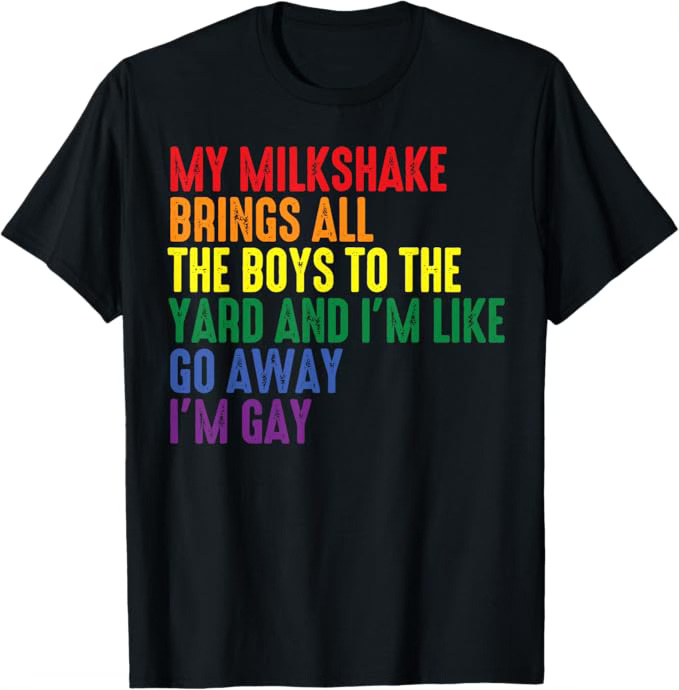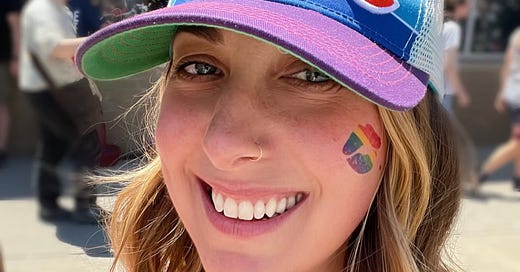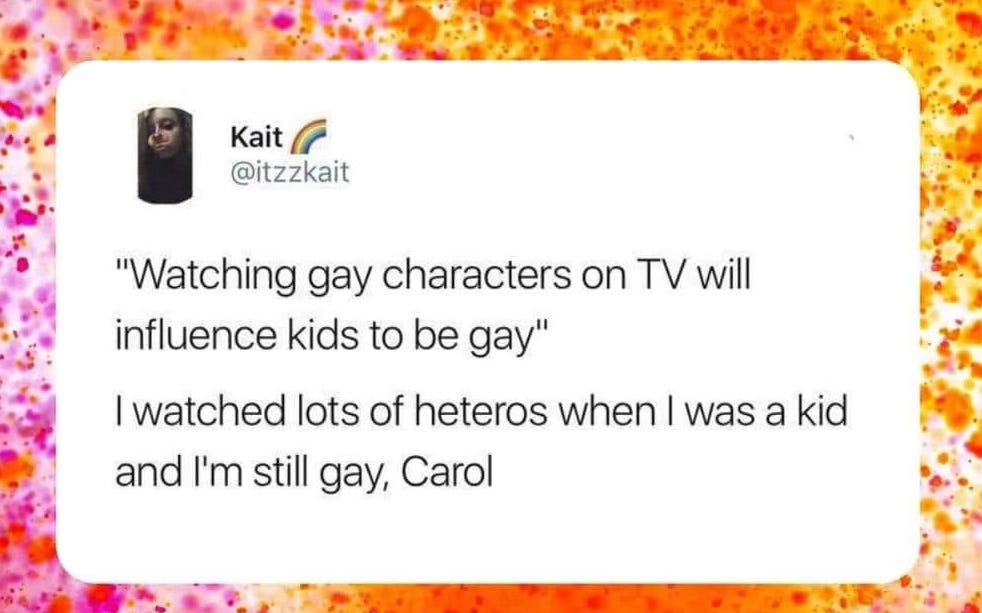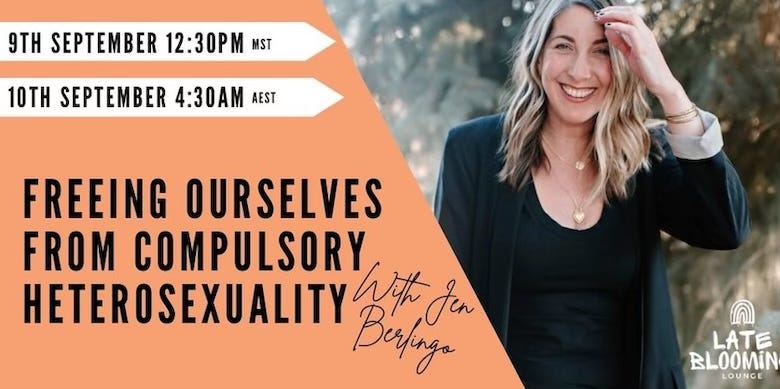why people don't come out as straight
the harm in assuming everyone is heterosexual from the jump
let’s talk about sexuality, baby…
No matter if you’re straight, queer, gay, asexual, questioning, or whatever term you use to describe who you’re attracted to, the topic of compulsory heterosexuality affects us all in ways that are personal to your life and/or to the life of someone you love.
The term compulsory heterosexuality, which is called “comphet” for short, was popularized by American literary icon, Adrienne Rich, in the 1980s. It essentially states that a patriarchal society expects and enforces heterosexuality. I think of comphet as how culture assumes each person is straight until they declare themself otherwise. Breaking it down, the word compulsory means something is required, obligatory, or that it involves compulsion or necessity, like a habit. Heterosexuality means being sexually attracted exclusively to people of another sex. (Notice I’m not saying “opposite sex” here because neither biological sex nor gender are binary, thus there are no opposites.)
Side note: The concept of cisnormativity describes the expectation that all people are cisgender, meaning that those assigned male at birth always grow up to be men and those assigned female at birth always grow up to be women. This term refers to gender, rather than sexuality, and these limited assumptions are certainly interwoven. Today’s post is focusing on sexuality. I wrote a lot about gender in an earlier post here. Please read.
the messages we received as children
No matter your sexual orientation today, you likely experienced heteronormativity as a child. Some of the ways I experienced it when I was a young girl were when adults around me would say things like “Do you have a little boyfriend, sweetheart?” or the bizarre compliment that “Boys will be knocking down the door to date you when you grow up! And I’m gonna have to beat them off with a baseball bat.” For some reason, the baseball bat threat always followed the line about these imaginary boys who’d be gathering on my front porch… it’s unnecessarily violent, but like…?

As a kid, did you get comments about your likely attraction (current or future) to someone who was a different sex from yours? If you are straight, comments like these might have felt totally fine for you. Perhaps you’ve had the privilege of never having thought about any of this at all. That’s the reality for so many people — whether it’s because you’re straight or you grew up in a time and place where things were different. There’s no benefit to anyone in blaming the past — blame is such a disempowered stance. It’s not your fault that society was/is so limited, but it is your responsibility to heal so it’s not perpetuated. We can all do better now that we know better, and we can evolve forward with the times and not plead ignorance. This is a chance to do just that. Thankfully, each generation younger than yours is healing from comphet, so it’s certainly time for us all to become responsible with the language we use.
As a person who has known I was queer since I made my Barbies make out in my Barbie Beach House (Kens cast aside somewhere, untouched), these presumptuous, heteronormative comments never felt good to me. The remarks (alongside seeing only heterosexual couples in the media and in my personal circles in the 70s and 80s in southeastern U.S., and alongside hearing ignorant and prejudiced slurs for gay people, and alongside uneducated fear of AIDS in the 80s, and alongside people grossly misinterpreting religious doctrines to say that gay people would go to hell, etc…) inadvertently shamed me out of honoring my innate desires. My environment taught me that because I identify as a woman that having a woman as a romantic partner could not be an option for my life. I went on to date boys and eventually men because not doing so felt like a very real risk of safety, security, acceptance, and love. Now that I wrote a book about this and get regular feedback from hundreds of readers who can relate, and now that I’m part of a few, private, virtual communities that each include at least 40,000 other women and non-binary people who also came out later in life with very similar stories, I know I was not at all alone in those feelings and fears.
Compulsory heterosexuality is harmful to queer folks because it erases and demonizes queer identities. (I’m using “queer” as the umbrella term here to describe all non-straight orientations.) Comphet forces people to adopt a system where we must perform straightness. It upholds this notion that anyone who isn’t heterosexual is considered deviant, and promotes stigma, reinforces grounds for discrimination, and limits the understanding of sexuality as expansive and fluid. The denial and/or lack of acceptance of a person’s sexual orientation increases mental health issues and suicide risk. (Same applies to cisnormativity and gender, of course.)
want to go deeper?
📖 Comphet is a big piece of my own personal story — the one that I tell in my award-winning memoir, Midlife Emergence. It’s available in paperback, ebook, and audiobook (read by me) on Amazon. If you want a less Bezosy place to buy it, check out bookshop.org or ask your local bookstore or library to order it if it’s not on the shelves.
💞 This is what we’re going to explore on a personal level in the experiential, online workshop I’m facilitating TODAY on this topic at 12:30pm Mountain Time. We’ll dive into messages we received from society, culture, and our own families over our lifetime and how they shaped us, how they planted seeds of shame, and how we can overturn these messages to claim our unique and authentic identities now. UPDATE: REGISTRATION IS NOW CLOSED FOR THIS EVENT.
You can attend for free only if you have/get an annual paid subscription to this Substack newsletter and if you REGISTER. If you’re not already a paying subscriber to prism, you’ll gain access to free events and other perks all year long!
First, get your annual prism subscription here (if you don’t already have one). Then, after you’re a paying subscriber, register for the workshop BEFORE 10am MST (REGISTRATION NOW CLOSED) so you’re all signed up in time to receive the event Zoom link.
I’d love to know: How has comphet impacted your life and/or the lives of those you love? Reply or comment here.
reading: The original paper on compulsory heterosexuality by Adrienne Rich, 1980.
podcasting: I had a chat with two other women who came out later in life about our experiences of comphet in this episode of Beyond the Closet:
inviting you to explore: I created a self-paced, online course called Queer Emergence, where you an explore these messages in your own life, in your own time and space and privacy. Info here.
loving this as a call for us all to heal: (Please double click below to play this powerful clip.)
Whether you’re an unpaid or paid subscriber to prism, having a spot in your inbox is an honor I don’t take for granted. It gives my art and writing a place to breathe. Thank you.











